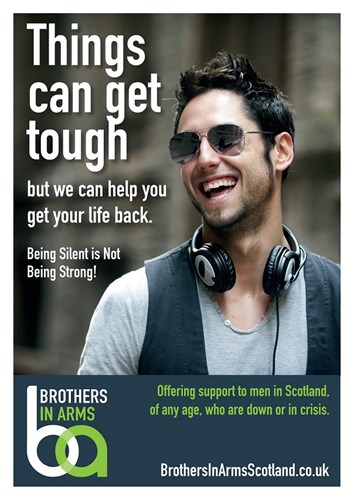Yes, your hilarious friend can still be depressed
Date: Tuesday 18 Jun 2019
''Very often when it comes to male suicide, it can turn out to be the guy you thought would be the least one to take his own life, because he would be the life and soul of the party, the one who everybody would turn to for their own support when going through life's difficulties, the 'fixer' of problems, the good guy...
So when you get the news, for family friends, peers and workmates, the shock can be enormous, no one would have had a clue, because we as men are so good at hiding it, wearing our suit of armour, while crumbling inside, that's why we at BIA are for all Brothers hiding in plain sight, the guy you sit next to on the train or subway who to all intents looks 'normal', the one you sit next to at work, who appears happy.

Depression doesn't discriminate, does not care what you earn, the football team you support or the politics you follow, it simply does not care, and don't assume for one minute that you are impervious to it, because you are not, it's just about how we as men deal with it and ignoring it obviously doesn't work and using alcohol, drugs or gambling to mask it, is a short term solution to a long term problem or male suicide would not be at the level it is.
that's why we advocate 'Prevention through Self-Management' and provide the tools and support as a gateway to start the journey to better mental-fitness.
Yes, your hilarious friend can still be depressed...
By Kate Lucy.
This ‘high functioning’ depression is often easy to miss Depression looks different on everyone and never seems to appear quite how you thought it would (a bit like an ASOS blouson). There are a staggering nine classifications of depression defined by psychiatric associations, but ‘laughing on the outside and dying on the inside’ hasn’t made it to the list yet. A lot of the funniest people we know are often (and really, it must be stressed that I don’t mean always) depressed. Humour and laughter can often come from a place of darkness, and comedy is the resulting wall put up between the ‘performer’ and their audience; if someone’s always cracking out jokes and making us all laugh, then they must live a smiling and hilarious life too, right? Not so much.
The link between humour and depression is well documented and was spoken about at length when comedian Robin Williams took his own life in 2014. People wondered ‘what did he have to be so sad about?’ as they imagined our loveable Mrs Doubtfire and Aladdin’s Genie bouncing around in his mansion, drumming up a side-splitting impressions routine before his staff of 27 and shelves of awards. Robin Williams perfectly summed up the relationship between mental illness and comedy, saying: ‘I think the saddest people always try their hardest to make people happy because they know what it’s like to feel absolutely worthless and they don’t want anyone else to feel like that.’ Studies have shown that experiencing low moods increases our capacity for empathy when we see others going through pain. Personally having previously been in a very dark place for a few years, I find myself going out of my way to make sure people are being looked after and are having a good time, because having a bad time is, well, the worst. Also, there’s still a stigma around mental health, and even the most outspoken about mental illnesses might struggle or have struggled to tell people what they’re going through. Humour can seem like the best cover-up for internal darkness – laughing people can’t be depressed, right?! Wrong. Obviously, wrong.

I’m not at all saying that all funny people hate themselves and that anybody who’s a guaranteed laugh-riot is probably dead inside, but maybe take a minute for your friends who seem so funny they couldn’t possibly be miserable. It’s natural to enjoy laughing responses to a joke you make and to want to keep that laughter going. If a ‘funny friend’ is constantly cracking out the witty responses even when you’re alone with them, there’s a chance they don’t want to remove the comedy barrier and show you who they are underneath, because they think that person is worthless. Another study suggests that being funny about a subject gives us a sense of control over a situation that we otherwise feel is overwhelming us or out of our hands. Even the phrase ‘well, you’ve got to laugh!’ when something unfortunate happens is us explicitly telling each other to choose the funny route that covers up the sad one.
But what can you do about it? Don’t start by telling your mate that you’re sick of their jokes and you want to see them cry, but maybe do show them some extra support if you think they might be suffering. Of course there’s a chance that they’re not and they’re just a naturally funny, happy person (what the hell is that like?), but if you’re concerned it’s not hard to chuck out a few extra texts asking how they’re doing or to send a link to something you think they might appreciate, for starters. Talking to your friend about the less comedic parts of life or asking for their advice around a problem you’re experiencing will show them that you value them for more than their surface-level bants. Comedy does not mean the same thing as happiness (clowns have always been a bit sad), and it can often be a huge barrier against something a lot darker. It’s no laughing matter.

